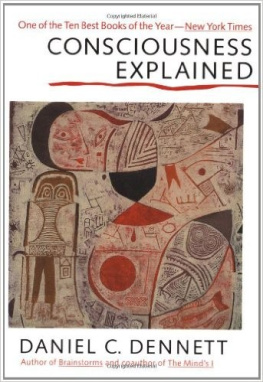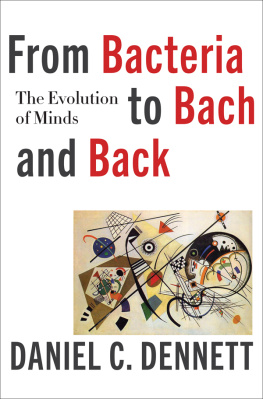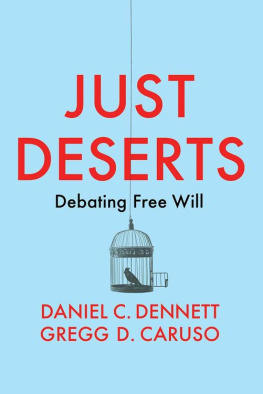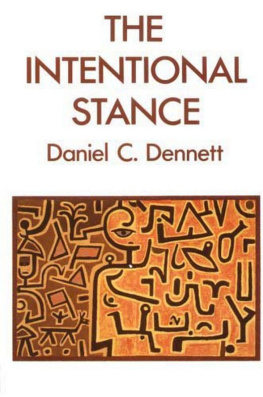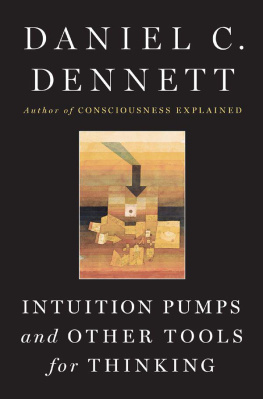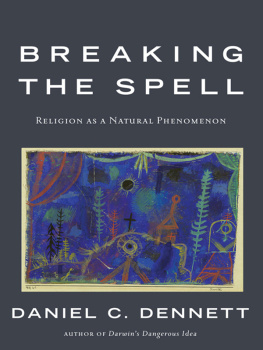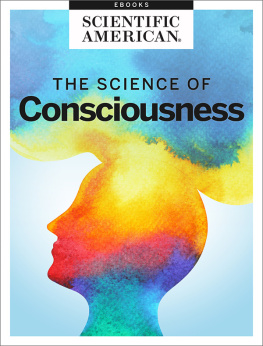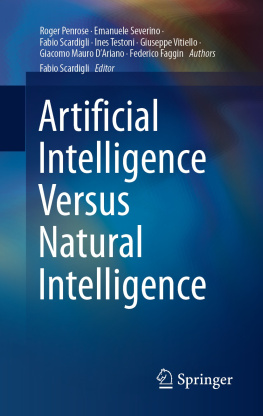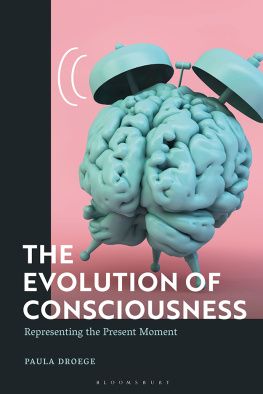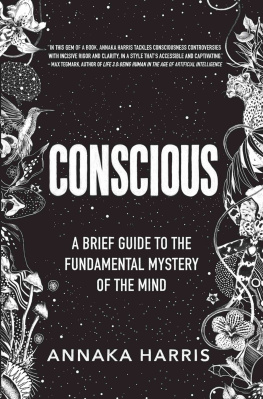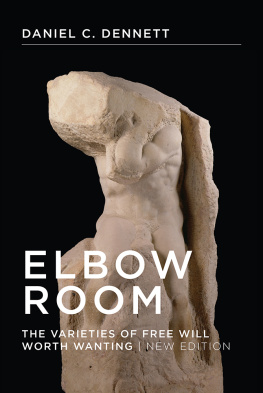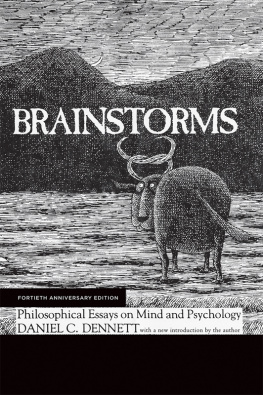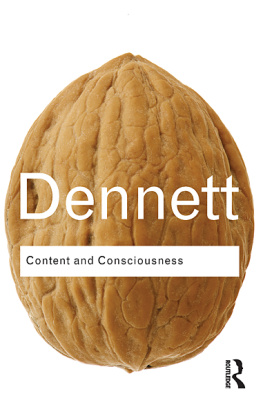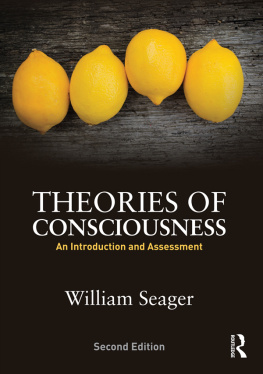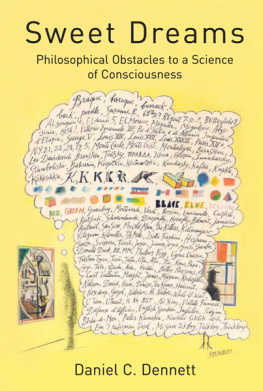Daniel C. Dennett - Consciousness Explained
Here you can read online Daniel C. Dennett - Consciousness Explained full text of the book (entire story) in english for free. Download pdf and epub, get meaning, cover and reviews about this ebook. year: 1992, publisher: Back Bay Books, genre: Politics. Description of the work, (preface) as well as reviews are available. Best literature library LitArk.com created for fans of good reading and offers a wide selection of genres:
Romance novel
Science fiction
Adventure
Detective
Science
History
Home and family
Prose
Art
Politics
Computer
Non-fiction
Religion
Business
Children
Humor
Choose a favorite category and find really read worthwhile books. Enjoy immersion in the world of imagination, feel the emotions of the characters or learn something new for yourself, make an fascinating discovery.
- Book:Consciousness Explained
- Author:
- Publisher:Back Bay Books
- Genre:
- Year:1992
- Rating:5 / 5
- Favourites:Add to favourites
- Your mark:
- 100
- 1
- 2
- 3
- 4
- 5
Consciousness Explained: summary, description and annotation
We offer to read an annotation, description, summary or preface (depends on what the author of the book "Consciousness Explained" wrote himself). If you haven't found the necessary information about the book — write in the comments, we will try to find it.
Consciousness Explained — read online for free the complete book (whole text) full work
Below is the text of the book, divided by pages. System saving the place of the last page read, allows you to conveniently read the book "Consciousness Explained" online for free, without having to search again every time where you left off. Put a bookmark, and you can go to the page where you finished reading at any time.
Font size:
Interval:
Bookmark:
ABOUT THE AUTHOR
Daniel C. Dennett is Distinguished Professor of Arts and Sciences and Director of the Center for Cognitive Studies at Tufts University in Massachusetts. He is the author of Content and Consciousness (1969); Brainstorms (1978); Elbow Room (1984); The Intentional Stance (1987); Consciousness Explained (1992; Penguin, 1993); the highly acclaimed Darwins Dangerous Idea (1995; Penguin, 1996); Kinds of Minds (1996); and Brainchildren (Penguin, 1998).

There are places in the book where I leap swiftly and without comment over major philosophical battles, or in other ways egregiously fail to fulfill the standard obligations of an academic philosopher. Philosophers who have read the manuscript of this book have raised questions about these gaps. The questions address issues that may not interest nonphilosophers, but they deserve answers.
You seem to pull a fast one at the end of , in the dialogue with Otto, when you briefly introduce presentiments as like speech acts with no Actor and no Speech, and then revise your own self-caricature, replacing the presentiments with events of content-fixation with no further explanation. Isnt this the crucial move in your whole theory?
Yes indeed. That is the primary point of contact with the other half of my theory of mind, the theory of content or intentionality most recently presented in The Intentional Stance. There are many more places in the book where I rely on that theory, but you have located the point that bears the greatest weight, I think. Without that theory of content, this would be a place where my own theory said, And then a miracle occurs. My fundamental strategy has always been the same: first, to develop an account of content that is independent of and more fundamental than consciousness an account of content that treats equally of all unconscious content-fixation (in brains, in computers, in evolutions recognition of properties of selected designs) and second, to build an account of consciousness on that foundation. First content, then consciousness. The two halves of Brainstorms recapitulated is simply that there was no useful way I could see to telescope the hundreds of pages of analysis and argument I have devoted to the theory of content into something both accurate and accessible. So if you think I have pulled a fast one in these pages, I beg you to consult the slow version in the other pages cited in the bibliography.
There seems, however, to be a tension if not an outright contradiction between the two halves of your theory. The intentional stance presupposes (or fosters) the rationality, and hence the unity, of the agent the intentional system while the Multiple Drafts model opposes this central unity all the way. Which, according to your view, is the right way to conceive of a mind?
It all depends on how far away you are, The closer you get, the more the disunity, multiplicity, and competitiveness stand out as important. The chief source of the myth of the Cartesian Theater, after all, is the lazy extrapolation of the intentional stance all the way in. Treating a complex, moving entity as a single-minded agent is a magnificent way of seeing pattern in all the activity; the tactic comes naturally to us, and is probably even genetically favored as a way of perceiving and thinking. But when we aspire to a science of the mind, we must learn to restrain and redirect those habits of thought, breaking the single-minded agent down into miniagents and microagents (with no single Boss). Then we can see that many of the apparent phenomena of conscious experience are misdescribed by the traditional, unitary tactic. The shock-absorbers that deal with the tension are the strained identifications of heterophenomenological items (as conceived under the traditional perspective) with events of content-fixation in the brain (as conceived under the new perspective).
Philosophers have often pointed out the idealizations of the traditional tactic, but have less often come to terms with them. For instance, a large philosophical literature has been devoted to the difficulties of the logic of reflexive states of belief and knowledge, beginning with Hintikka (1962). One of the essential idealizations of Hintikkas formalization, as he made explicit, was that the statements governed by the logic he presented must be made on one and the same occasion. The notion of forgetting is not applicable within the limits ). The importance of this limitation, he noted, had not always been appreciated and it has typically been lost in the clouds of subsequent controversy. Hintikka recognized that this quantizing of occasions is a necessary simplification required to formalize the everyday concepts of belief and knowledge in the way he did; it fixes the content at an instant, and thereby fixes the identity of the proposition in question. I have claimed here that this artificial individuation into states and times is one of the features that turns these folk-psychological concepts into fantasies when we try to map them onto the complexities of what happens in the brain.
What, in the end, do you say conscious experiences are? Are you an identity theorist, an eliminative materialist, a functionalist, an instrumentalist?
I do resist the demand for a single, formal, properly quantified proposition expressing the punch line of my theory. Filling in the formula (x) (x is a conscious experience if and only if) and defending it against proposed counterexamples is not a good method for developing a theory of consciousness, and I think I have shown why. The indirectness of the heterophenomenological method is precisely a way of evading ill-motivated obligations to identify or reduce the (putative) entities that inhabit the ontology of subjects. Do the anthropologists identify Feenoman with the chap they discover who has been doing all the good deeds in the jungle, or are they eliminativists with regard to Feenoman? If they have done their job right, the only issue left over is one that can be decided as a matter of diplomatic policy, not scientific or philosophical doctrine. In some regards, you could say that my theory identifies conscious experiences with information-bearing events in the brain since thats all thats going on, and many of the brain events bear a striking resemblance to denizens of the heterophenomenological worlds of the subjects. But other properties of the heterophenomenological items might be deemed essential such as the position items take in the subjective temporal sequence, in which case they couldnt be identified with the available brain-events, which may be in a different sequence, on pain of violating Leibnizs Law.
The question of whether to treat part of the heterophenomenological world of a subject as a useful fiction rather than a somewhat strained truth is not always a question that deserves much attention. Are mental images real? There are real data structures in peoples brains that are rather like images are they the mental images youre asking about? If so, then yes; if not, then no. Are qualia functionally definable? No, because there are no such properties as qualia. Or, no, because qualia are dispositional properties of brains that are not strictly definable in functional terms. Or, yes, because if you really understood everything about the functioning of the nervous system, youd understand everything about the properties people are actually talking about when they claim to be talking about their qualia.
Next pageFont size:
Interval:
Bookmark:
Similar books «Consciousness Explained»
Look at similar books to Consciousness Explained. We have selected literature similar in name and meaning in the hope of providing readers with more options to find new, interesting, not yet read works.
Discussion, reviews of the book Consciousness Explained and just readers' own opinions. Leave your comments, write what you think about the work, its meaning or the main characters. Specify what exactly you liked and what you didn't like, and why you think so.

